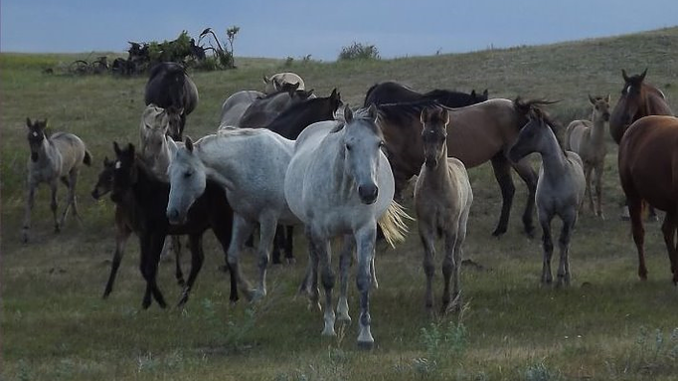
Last month I wrote about my experience at the ranch of Gladstone resident, Gary Dassinger, and about his being put through the wringer on charges of animal abuse and neglect. Charges based on a 2013 law passed in North Dakota with the support of the Humane Society of the United States (HSUS).
As part of those articles, I explained the “seizure in place order” that was served by the Stark County Sheriff’s Department– which means the animals remain on the ranch, but are technically under the supervision of Stark County Sheriff’s Department. As we now await Judge Rhonda Ehlis’ decision in the civil case against Dassinger, I have been considering the aforementioned seizure order. And I’m not convinced it’s legal.
In part, the 2013 law passed by the North Dakota Legislature is now found in North Dakota Century Code (NDCC) 36-21.2. The specific reference to seizure of animals, alleged to have been abused or neglected, is found under Section 36-21.2-05 “Seizure of animal – Court order”:
“1. A law enforcement officer, upon a recommendation from a licensed veterinarian approved by the board of animal health, may petition the court for an order directing the seizure of any animal believed to have been neglected, abused, treated cruelly, or subjected to any act or omission in violation of this chapter .”
While the law is horribly intrusive, this section is specific and actually seems to support the idea that the vast majority of animals currently under a “seizure in place order” are being held as such unlawfully. Why? Because there are only specific animals in question as part of the case.
This point is evident by the arguments that Stark County State’s Attorney Tom Henning is trying to make against Gary. He is specifically using testimony from Veterinarian Kim Brummond – and associated pictures of specific animals – in an attempt to prove his case. Therefore, according to the law, any seizure should relate only to those animals “believed to have been neglected, abused, treated cruelly, or subjected to any act or omission in violation of [the] chapter”.
But instead of seizing the specific animals in question – as I believe this law calls for – they have a seizure in place for them all. And that’s a major problem. How can they legally seize animals without evidence of neglect and abuse? From what I’m reading, they can’t.
This point is also strengthened by the fact that two other veterinarians – Gary’s veterinarian, Chance Noyce, and the third party veterinarian, Carolyn Woodruff – both testified that seizure was unnecessary for any of the animals.
Not only do I believe the current “seizure in place order” is unlawful, but its enforcement is actually prohibiting Gary from selling animals. This is problematic on at least three fronts: 1. Gary has no means of gaining income from the animals. Yet, he is currently incurring the costs associated with their care. His inability to sell means it could potentially hamper his ability to continue caring for them in the long run– remember, this is a ranching operation. A rancher obtains income through the sale of animals.
2. It also inhibits his ability to raise funds for the mounting legal expenses he is incurring as a result of the case.
3. And perhaps this is the most fascinating of the three. If the county truly believes Gary’s animals should be seized and taken elsewhere – something they attempted to do, but were ultimately prohibited from via a temporary restraining order – wouldn’t they find it in the best interests of the animals to be sold to new homes?
I say that the third point is perhaps the most fascinating for a reason. Could it be that the seizure order for all the animals is a strategic move in an attempt to ensure Gary does not have the funds to fight the case all the way through? Meaning, are they literally trying to bleed Gary’s financial resources dry in an attempt to win a case that has a horrible legal foundation?
Aside from Constitutional issues, at the end of the day not only do I see the “seizure in place order” as unlawful according to the 2013 law itself, but it’s just one piece of evidence to me of the abuse that Gary Dassinger is enduring as a result of this case. The county is not only harming his reputation, but they’re hampering his ability to make money. It’s a despicable move and one that should not go unnoticed by the people of Stark County, the State of North Dakota, and beyond.
NOTE:
If you’d like to support Gary Dassinger, please visit the “Support Dassinger Ranch” Facebook page: https://www.facebook.com/groups/280418352430392/
A Go Fund Me account has been set up to help defray the mounting legal expenses for Gary. If you can help, please visit here: https://www.gofundme.com/dassingerranch
***Editorial Note: I am including the links to all previous Minuteman articles below. If you are just now reading about the Gary Dassinger case, it is best to go back and read those articles to understand the context of the story. Those articles also source local news articles that can be read as well.***
Sources:
1. http://www.legis.nd.gov/cencode/t36c21-2.pdf#nameddest=36-21p2-05
2. https://theminutemanblog.com/single-post/2017/06/15/The-Tragic-Story-of-North-Dakota-Rancher-Gary-Dassinger
3. https://theminutemanblog.com/single-post/2017/06/16/Unthinkable-UnAmerican-Governments-Abuse-of-Gary-Dassinger
4. https://theminutemanblog.com/single-post/2017/06/21/Justice-for-Gary-Dassinger-Will-be-Found-in-an-Informed-Jury





